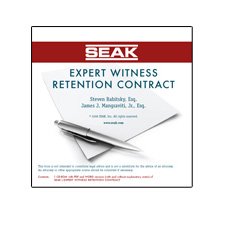The most common problem that expert witnesses face is non-payment or slow payment of their fees by lawyers who retain them. Many of these expert witnesses do not have a written retention contract signed by counsel.
Example
I was recently contacted by an expert witness who was asked to investigate a claim and write a report. The expert conducted the investigation, wrote the report, and presented his bill for $9,000 to counsel. Counsel refused to pay the bill. The expert did not have a written retention contract signed by counsel. It is highly unlikely that this expert will receive payment for his time and effort. The expert’s options: suing for non-payment or complaining to the bar association (will be time consuming as he has no written contract and may not work).
Many experts without retention contracts end up being owed tens of thousands of dollars or more and may never end up getting paid.
Some bar associations are now recognizing the need to for written contracts between lawyers and the experts they retain.
For example, the Colorado Bar Association has promulgated the following rules:
Expert Witness Compensation and Expert Witness Fees
9.1 Experts and attorneys should strive to agree in advance concerning the nature and scope of the services to be performed, the terms and amounts of compensation to be paid for those services, and the responsibility for payment of that compensation. Absent an agreement, disputes may arise which will require resolution by the court or an interprofessional committee.
The expert is entitled to reasonable compensation for providing services in connection with litigation. The issues of fees, costs, and scope of employment for expert services are frequent areas of disagreement. This is usually due to lack of open communication and the absence of a prior agreement between the expert and the attorney.
Therefore, whenever possible, these issues should be clarified before services are rendered and, whenever possible, confirmed by written agreement. It should be remembered that “an agreement” is not created by simply sending out a fee schedule, but is a product of negotiation and mutual consent. Failure by an attorney to object to a written fee policy may be an implied consent to abide by its terms. The agreement should be tailored to fit the specific circumstances, but it is suggested that the following be included:
(1) The scope of services to be performed by the expert;
(2) The rate of compensation to be paid for the expert’s services, including whether the fee will vary depending upon the services rendered, e.g., research, review of documents, examination, dictating of report, travel, or testimony;
(3) Whether advance payments or retainers are required and, if so, under what circumstances;
(4) The handling of costs and expenses;
(5) Cancellation terms and amounts; and
(6) The person or persons responsible for payment of those costs and fees.
Experts are encouraged to develop office policies concerning involvement in legal matters, which can then be reduced to writing and provided to the attorney at the time of the initial request.
An attorney provided with such a written policy should immediately assent or object to the terms provided. It is improper for the attorney who does not object to continue to request the expert’s services after being advised of the expert’s policies for involvement in legal matters and then later deny that he or she agreed to the terms of those policies. However, the expert should recognize that providing the attorney with the expert’s policies merely constitutes an offer and does not bind the attorney or client until they expressly or impliedly agree to those terms.
If no agreement can be reached between an expert and an attorney, the expert must recognize that he or she can still be compelled to provide necessary information and a court or interprofessional committee may be called upon to determine the amount and terms of reasonable compensation. A non-treating or consulting expert can simply refuse to participate absent an agreement with the attorney or his or her client.
9.2 An expert is entitled to fair and reasonable compensation for providing expert testimony.
In determining what constitutes a fair and reasonable expert witness fee, some or all of the following factors should be considered:1
(1) The amount of time spent, including review, preparation, drafting reports, travel, or testimony;
(2) The degree of knowledge, learning, or skill required;
(3) The amount of effort expended;
(4) The uniqueness of the expert’s qualifications;
(5) Current and reliable statistical income information of similarly situated experts;
(6) The amounts charged by similarly situated experts for similar services;
(7) The amount of other professional fees lost; and
(8) The impact, if any, on the expert’s practice because of scheduling difficulties, other commitments, or other problems.
An expert should also be aware that some statutes, such as those governing workers’ compensation claims, set reasonable medical fee schedules and provide that it is unlawful, void, and unenforceable as a debt for any health care provider to charge a claimant in excess of the scheduled fee. See C.R.S. §8-42-101(3).
The use of itemized billing by the expert to the attorney should be encouraged and will often expedite payment.
SEAK, Inc. provides an expert witness retention contract which is currently in use by over 2,000 expert witnesses nationwide.

